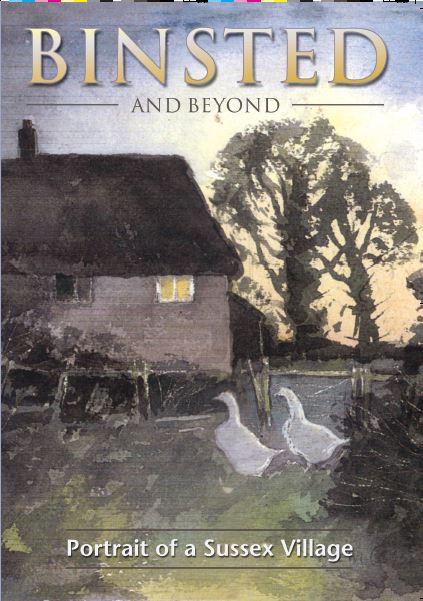Prose
Past prose writing, in or connected with Binsted, is being discovered - even whilst more continues to be created,
not least 'Binsted and Beyond' created in 2002 by our Binsted Book Group.BINSTED AND BEYOND
Order a printed copy from Emma Tristram
OR
Click on the book cover to
download the book from Dropbox.
NB LARGE FILE 279MB!!! Leave to
download overnight if necessary.On this page we feature some excerpts from the writings of people who have loved and written about Binsted
in the time of the second world war - Laurie Lee, Clare Druce, Michael Wishart.From Laurie Lee's diary, Sunday Aug 18th 1940:
The mooing of heifers in Wilma’s garden awoke me in the morning. L came down in her scarlet frock. As we walked back up the lane towards Arundel, the all clear sounded. Wilma left us and we lay in the wood happy but distant. The drone of planes was continuous.
About one o clock it grew louder, more threatening, like a swarm drawing near. Suddenly the warning went again and almost immediately the ground shook beneath our bodies and the dull thump of bombs sounded in the distance. We walked out of the wood and presently saw English fighters flying back to their aerodromes in threes and singly. 'The raid is over', said L. Soon the sky setled and the all clear sounded. We walked slowly down the road and entered a different part of the wood. It was hot and green and dusty. Under the leaves with a bottle of beer we lay and forgot everything but the smell of the trees and the smell of the Arun, Martigues, Kenton. The sky was buzzing with anger again but we succeeded in ignoring it, we were as detached, as otherwise intent as insects there among the broken sticks, the trailing thorn ... And we lay together looking into one another's eyes acting our own war and peace, while our bodies listened uneasily.
As we kissed there was a burst of machine-gun fire, loud, in the sky. It rattled across the hills like an oath. With our faces together we waited for the next, our lips were warm against each other, the machine-gun cracked again and with our lips still touching we stared into the sky in each other's pupils, incredulous but without any surprise. Then all around the ground shook, the dry leaves crackled with repeated bombs, machine-guns bred and multiplied, planes tore their harsh parabolas across the sky and the siren split them all with its tragic wail. The sky was full, cut, slashed and shattered with noise. The ground heaved with the throb of bombs. We were still kissing.
'I must see this', I said so we crept through the undergrowth and I ran from tree to tree to the edge of the wood. I lay in a ditch and watched. The sky heaved and boiled. I saw planes whirling round each other like little wooden crosses tossed up by a juggler. The noise was indescribable. I lay there for some moments my heart throbbing then I ran back to L crouching under a tree. We remained there waiting and helpless, fascinated. The bombs continued to fall with horrible deliberation, so irrevocable. Everything seemed to be directly above us, everything seemed to be aimed at us, we heard the vicious tearing whines of crashing planes coming down straight to us. We were uncovered, our backs tingled as we lay.
Presently the sound of battle shifted. We walked down to the road again and looked once more down into the sky ... The aerodrome was blazing. We sat by the roadside and the battle receded into the distance ... We found we were sitting by the gate of the cottage hospital, and very soon the ambulances began to arrive.
Notes:
- Quoted by Valerie Grove in 'The Life & Loves of Laurie Lee', Robson Press 2014, pp 117-8
- Wilma = Wilma Gregory, a patroness, at Glebe Cottage Binsted.
- L = Lorna Wishart, Laurie Lee's lover and the wife of Ernest Wishart the principal landowner and farmer at Church Farm and Marsh Farm in Binsted.
Clare Druce also remembers wartime in Binsted, in 'Darling Girl', AML Press 1997:
Some of our war was spent on a smallholding in a Sussex hamlet. Binsted was my paradise, allowing a freedom today's children rarely know - a car in the lane would have been an event worth reporting. "Mill Ball" was not on any kind of 'mains', and the soft glow of candles and oil lamps lit the house, while Valor heaters cast magical patterns on the ceiling, as we children lay safe in the depths of our feather mattresses. Somewhere, I have a photo of my sister and me standing in a potato field, on either side of Paul, a German prisoner of war, drafted in to work on the land. From our happy faces, he could have been a favourite uncle. ... There were Italian prisoners, too, who gave us presents of beautiful dolls' cradles, woven out of twigs gathered from the Sussex hedgerows.
The artist Michael Wishart, one of the sons of the family who own Church Farm and Marsh Farm in Binsted, wrote in 'High Diver' (Quartet, 1978, p. 20-21) of his love of the people and the landscape of Binsted, through which he describes walking with another German prisoner of war:
As far back as I can remember, certainly before I could speak, I loved to draw and paint, in all their seasonal change, our fields, our parks, our hedges; brooks; barns; trees; and our skies. Of all places to spend these enchanted hours, I preferred our graveyard. It was hardly larger than a more temporary dormitory. I would seat myself against its southern wall, warm in the sunshine, where the corpses of old labourers some of whom I had known and loved, threw up an abundance of violets of both varieties, scattered rugs of purple and white.
The German found me here one afternoon and sat beside me, watching me paint. Our privacy, his boredom and loneliness, broke down all vestiges of hostility. I knew that he would follow wherever I led. From the church, and off the main lane which is all our village offers, there runs a muddy path, through fields, across a bridge in a small, sunken copse, into what was then parkland: a grand, broad, upward slope of green, dotted with ancient trees.
Binsted Park epitomised the vanishing England of my youth. Hares sliced bluish traces through the green-gold grass. I led my prisoner past the white shell of a manor whose ghostly facade appeared to tremble in the breeze, past a black pool with green water lilies, far into our dense woodland.
Notes:
-
Binsted Park is the large curved field within Binsted Woods which, in about 1800, was turned into a mediaeval style park, with a ha-ha and great oaks reclaimed from woodland, by the owners of the old manor house, Binsted House (on whose site a new mansion now stands).
-
The 'black pool', created as one of the fishing and boating ponds of the old manor house, is now known as the Madonna Pond, from the statue of the Virgin Mary erected there by Lorna Wishart.
-
The 'muddy path' opposite the church is still known locally as Muddy Lane, although its proper name is Church Lane - being the track along which the family would in former times approach the church from the manor house - on one recorded occasion in a coach pulled through the mud by six oxen.



